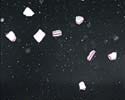Coded Particles Protect Resins Against Counterfeiting
May 11, 2003
Originally Published MPMNMay2003
INDUSTRY NEWS
Coded Particles Protect Resins Against Counterfeiting
Zachary Turke
|
This magnified image shows microtag particles from RTP Co. suspended in a polycarbonate resin. |
As more and more manufacturing operations shift to locations outside the United States, the chance that the products they produce will be threatened by counterfeiting increases correspondingly. Patented resins, according to some experts, are particularly susceptible to this threat because the deception is often undetectable without complex chemical analysis. That is why RTP Co. (Winona, MN; www.rtpcompany.com) has developed a process called microtagging. Based on a technique developed to track terrorism in the explosives industry, the microtagging process incorporates minute coded particles into thermoplastic compounds to allow identification and authentication.
"The microtag particle is essentially a unique numeric code sequence supplied in a microscopic multicolor layered format," says product manager Stuart Swain. "A specific sequence is produced for each customer and application, and we never use the same code twice," he adds. To suit a variety of production requirements, the particles are available in sizes of 20-60 µm. RTP offers the option of adding them to the thermoplastic material they protect during compounding or supplying them in concentrate form for use at the molding stage.
And according to Swain, the method used to detect counterfeiting is as simple as the particles themselves. "All you need is an ultraviolet light and a 100¥ magnifying glass, and you can determine definitively if you have the correct resin, compound, or alloy," he says. For those who don't wish to perform visual identification, the company can also imbue the particles with magnetic and other qualities that can be detected by scanners and electronic sensors.
Copyright ©2003 Medical Product Manufacturing News
You May Also Like


.png?width=300&auto=webp&quality=80&disable=upscale)
